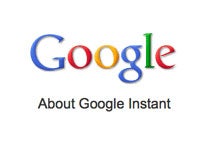 That’s what it’s called – “Google Instant” and according to the AdWords help section, as users type, AdWords will deliver ads: “As a user starts to type a search, Google Instant automatically shows results for a popular search that begins with those letters. An algorithm tries to predict what the rest of the query might be based on popular queries typed by other users. The predicted text is shown in light grey in the search box, and search results and ads are automatically shown for that predicted query.” Read the help page. And, visit the Google Instant site.
That’s what it’s called – “Google Instant” and according to the AdWords help section, as users type, AdWords will deliver ads: “As a user starts to type a search, Google Instant automatically shows results for a popular search that begins with those letters. An algorithm tries to predict what the rest of the query might be based on popular queries typed by other users. The predicted text is shown in light grey in the search box, and search results and ads are automatically shown for that predicted query.” Read the help page. And, visit the Google Instant site.
Oh baby.. this could have far reaching implications, bidder-holics.
For now, this appears to be just for search queries on Google.com – not for graphical display which could, in theory, be connected with Google’s search partners. Imagine targeting an “instant” of a query using real-time bidding (RTB) with a display ad. Someone could bid on “demand” or “demand side” only and potentially beat bidders for long(er)-tail phrases such as “demand-side platform,” etc. Search and display come closer together. Nutty.
What’s more – think about the Google search partner who gets paid on a CPM basis. Do you think they’d move their AdSense tag higher in their ad network stack if they were getting paid more through multiple Instant display ad impressions? Sure! – Perhaps the consumer sees 3 ads instead of one with some sort of time and impression limit set by Google and/or the publisher. Diabolical! OK, to be clear, this is not happening yet.
But wait. Let’s keep going while the RTB mojo is flowing.
One more thing on paid ad impressions around organic search on Google.com. If Google made its paid search ads real-time bidding enabled, where the bidders could see a user cookie as a user inputs a query, all bidding hell breaks loose especially when its overlayed with the quality score black box. Attribution between display and search and other digital channels gets even tighter. Ad spend increases as marketers can clearly see the effects between channels as the bidding swivels on the cookie. Publishers with valuable audience make mo’ money which fuels creation of better or sustained content for consumers. It’s a Holy Grail! – or should be.
And, the Kawaja ecosystem map will fragment into 100 more maps as new SEMs, agencies, DSPs, maybe your mom, start their own bidding shop.
And, AdExchanger.com will get a new links page.
And, Google will own us all.










